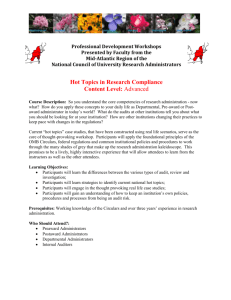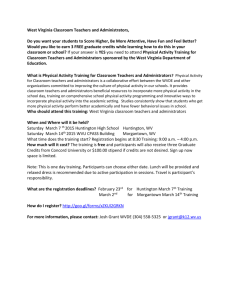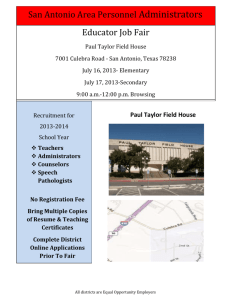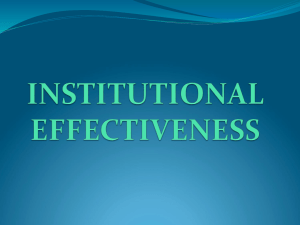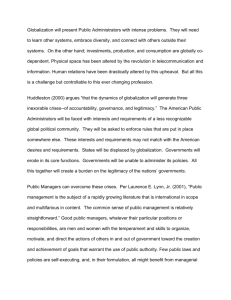1999 University of Reading Annual Meeting 7th
advertisement
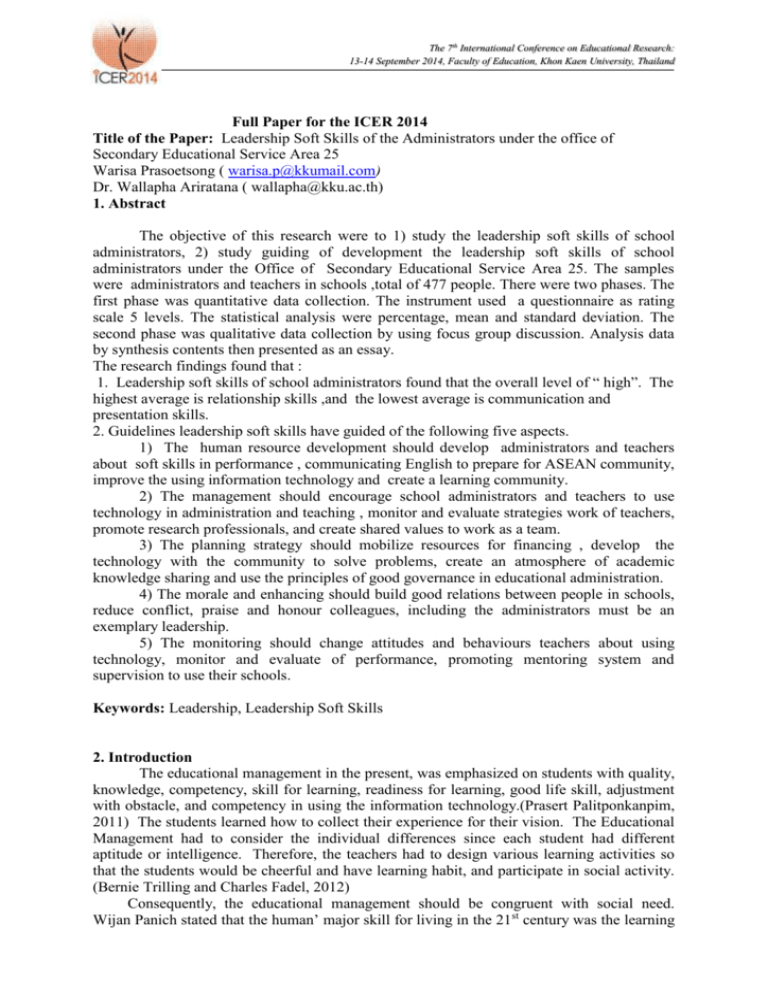
The 7th International Conference on Educational Research: 13-14 September 2014, Faculty of Education, Khon Kaen University, Thailand Full Paper for the ICER 2014 Title of the Paper: Leadership Soft Skills of the Administrators under the office of Secondary Educational Service Area 25 Warisa Prasoetsong ( warisa.p@kkumail.com) Dr. Wallapha Ariratana ( wallapha@kku.ac.th) 1. Abstract The objective of this research were to 1) study the leadership soft skills of school administrators, 2) study guiding of development the leadership soft skills of school administrators under the Office of Secondary Educational Service Area 25. The samples were administrators and teachers in schools ,total of 477 people. There were two phases. The first phase was quantitative data collection. The instrument used a questionnaire as rating scale 5 levels. The statistical analysis were percentage, mean and standard deviation. The second phase was qualitative data collection by using focus group discussion. Analysis data by synthesis contents then presented as an essay. The research findings found that : 1. Leadership soft skills of school administrators found that the overall level of “ high”. The highest average is relationship skills ,and the lowest average is communication and presentation skills. 2. Guidelines leadership soft skills have guided of the following five aspects. 1) The human resource development should develop administrators and teachers about soft skills in performance , communicating English to prepare for ASEAN community, improve the using information technology and create a learning community. 2) The management should encourage school administrators and teachers to use technology in administration and teaching , monitor and evaluate strategies work of teachers, promote research professionals, and create shared values to work as a team. 3) The planning strategy should mobilize resources for financing , develop the technology with the community to solve problems, create an atmosphere of academic knowledge sharing and use the principles of good governance in educational administration. 4) The morale and enhancing should build good relations between people in schools, reduce conflict, praise and honour colleagues, including the administrators must be an exemplary leadership. 5) The monitoring should change attitudes and behaviours teachers about using technology, monitor and evaluate of performance, promoting mentoring system and supervision to use their schools. Keywords: Leadership, Leadership Soft Skills 2. Introduction The educational management in the present, was emphasized on students with quality, knowledge, competency, skill for learning, readiness for learning, good life skill, adjustment with obstacle, and competency in using the information technology.(Prasert Palitponkanpim, 2011) The students learned how to collect their experience for their vision. The Educational Management had to consider the individual differences since each student had different aptitude or intelligence. Therefore, the teachers had to design various learning activities so that the students would be cheerful and have learning habit, and participate in social activity. (Bernie Trilling and Charles Fadel, 2012) Consequently, the educational management should be congruent with social need. Wijan Panich stated that the human’ major skill for living in the 21st century was the learning The 7th International Conference on Educational Research: 13-14 September 2014, Faculty of Education, Khon Kaen University, Thailand skill and innovation, problem solving as the experts, communication and cooperation, creative thinking, critical thinking, information technology and communication skills in order to access the information quickly, occupational skill, life skill, social skill, cross cultural skill, leadership and responsibility skill. Furthermore, the school administrators’ duty was to develop theses skills for school staffs as best as it could be. (Wijan Panich, 2012) For.school..management,.the school administrators had to use their major skills in organizational management including the technical skill, the conceptual skill, and the human skill for integrating and associating their implementation for work efficiency. (Katz, 1974) Wijan Panich (2012) stated that the recent work management, the administrators had to have skill in administering the human beings as well as the work. The “soft skill” was related to human skill focusing on the competency in working with the other persons. It was supported by Wilaipan Wiwek’s (2013) statement that the “hard skill” was basic factor for human better work, for instance, thinking skill, interpersonal skill, and motivation skill. Specifically, the educational management was emphasized on progressive management to be ready for changing with cooperation by all of school staffs. As a result, the administrators had to use their knowledge as well as modern science and management skill into many school processes with participation focusing on communication for developing the awareness and development continuously in order to accomplish goal. Wijan Panich stated that the leader in this age needed to integrate their hard skill, and soft skill to be used in organization as well as increase efficiency and effectiveness of work practice especially the leadership soft skill was an important one for developing and learning new things to be occurred from cooperated work. It was supported by Tang’s (2012) statement that the leaders had to be experts in using their soft skill because leadership needed to be competent in moving the organization efficiently and effectively. The leaders with soft skill required the human development process, for instance, team work skill, communication, creativity, and presentation. It was supported by research findings of Wallapha Ariratana (2012) in presentation of soft skill usage for the administrators and teachers in educational management covering all 7 skills including the analytical thinking and problem solving, the communication and presentation, the team working, studying, learning, and usage of information technology, the development and construction of innovation, morality, and professional. In addition, the research findings indicated that the administrators who were able to use their Soft Skill Leadership in teaching professional development, and students’ learning achievement as well as organizational climate. The Office of Secondary Educational Service Area 25, was a work unit being responsible for taking care of Educational Management in 84 Secondary Schools of Khon Kaen Province. The vision was to be quality organization focusing on Educational Development into universal standard within 2018 academic year by specifying the strategies of Educational Service Area in cooperation, promotion, and support for the educational management of school to be thoroughly, and teacher and staff development in the whole system, and development in efficient educational management focusing on participation by every sector. ( The Office of Secondary Educational Service Area 25, 2012) But, according to the report of work performance in 2012 academic year in efficiency of educational management, found that the participation of teachers and staffs in school work management, was not able to be implemented concretely, lacked of communication throughout the organization, and the insufficient usage of information technology media. According to the findings of implementation, it could be viewed that the school administrators were not able to put the policy and strategies into school management efficiently as it should be. As a result, it affected the quality of school, teachers, staffs, and students as well. (The Office of Secondary Educational Service Area 25, 2012) According to the above reasons, it could be seen that the school administrators were the most important persons in moving the organization for changing into ASEAN community. The administrators in this age, required leadership focusing on participation as The 7th International Conference on Educational Research: 13-14 September 2014, Faculty of Education, Khon Kaen University, Thailand well as professional truly. So, the administration and management had to expend major skill as human or staff development as the important power for movement or changes. The leaders who could use soft skills would emphasize on promoting and encouraging every staff to collaborate in one’ work for shared learning as well as continuous development in order to accomplish school goal. The researcher working in The Office of Secondary Educational Service Area 25, was interested in studying the level of school administrators’ leadership soft skill as well as guidelines for developing the school administrators’ leadership soft skill in order to obtain the useful information technology which would be able to be used as guidelines for the administrators to use in administration and management in developing the educational quality further. 3. Research Questions 1. What is the level of leadership soft skills of school administrators under the Office of Education School Area 25 ? 2.How should we develop the leadership soft skills of school administrators under the Office of Education School Area 25 ? 4. Research Objectives 1.To study the leadership soft skill of school administrators under the Office of Secondary Educational Service Area 25. 2. To study the guidelines for developing leadership soft skills of school administrators, under the Office of Secondary Educational Service Area 25. 5. Research Methodology The kind of research is mixed methods research between quantitative and qualitative research. 5.1 Population and Samples) Population: the using in this study consisted of the school administrators and teachers under The Office of Secondary Educational Service Area 25, 2013 academic year including 201 school administrators, and 3,382 teachers, total of 3,583 persons from 84 schools. . Samples: the sample sized was determined by Krejcie and Morgan’ Table. The samples were selected by using Stratified Random Sampling based on school size. They were 132 school administrators, and 345 teachers, total of 477 persons. 5.2 Variables The studied variables were 8 aspect of soft skill leadership of school administrators including: 1) the communication and presentation, 2) the leadership competency, 3) the team working, 4) the analytical thinking and creative problem solving, 5) the professional and morality, 6) the learning, 7) the usage of information technology, and 8) the development of interpersonal relationship. 5.3 Instruments The 7th International Conference on Educational Research: 13-14 September 2014, Faculty of Education, Khon Kaen University, Thailand The instrument using for data collection, was the questionnaire constructed based on conceptual framework. It was divided into3 parts. Part1,included the respondents’ demographic data. Part 2, included the opinion on soft skills leadership. Part 3, included the opinion on guidelines for developing the school administrators’ leadership soft skill, as the open-ended question. The instrument validation was performed by: 1) Content validity was investigated. In addition, the experts’ index of congruence (IOC) was found ranged between 0.60 -1.00. 2 ) The reliability was checked by trying out the improved and validated Questionnaire with 30 administrators and teachers who were not the samples to find Reliability value. The reliability of total issue was = 0 .978. 5.4 Data Analysis The quantitative data analysis, was performed by responding Part 1 is the questionnaire: the respondents’ demographic data by tallying frequency and finding the percentage. Part 2 is the opinion on the school administrators’ soft skill leadership by using ̅), and standard deviation ( S.D.). And part 3 is the opinion on soft the statistic as mean (X Skill leadership, was calculated the frequency and percentage, and concluded in table. 6. Conclusions and Discussions 6.1 Conclusions 1.The research findings of school administrators’ leadership soft skill, in overall, the average value was in “High” level. The highest level of average value, was the development of interpersonal relationship. On the contrary, the aspect with lowest level of average value, was the communication and presentation. 2.Guidelines for developing the school administrators’ leadership soft skill , were as follows: 1( The staff development, the implementation should be performed in the following issues: The first, development of administrators and teachers relating to soft skill as well as work practice, and the English language usage and development in usage of information technology by action research workshop, The second , usage of mentoring & coaching for promoting the construction of learning innovation, and the third, enhancement for developing the learning community. 2) The administration and management, should be implementation as follows: The first, the promotion for the school administrators and teachers to use the information technology in their administration and management, and learning, The second, the staffs should be provided opportunity in presenting the necessary information technology for the conference, and reporting the work performance, the third, the teachers’ work should be followed up and evaluated, The forth the research should be enhanced as professional, and Finally, the development of shared value, and collaborative team working. 3) The strategic planning, should be promoted in the followings: The first, the collection of resource for providing and developing the technology equipment, with community. The second , the systematic problem solving was emphasized on the usage of information technology in decision making as well as problem solving, the third, the development of academic and sharing climate, and the last, the application of good governance in administration and management. 4) The development of morale consisted of the creation for friendly climate as well as decreasing the conflict, the development of good relationship among staffs in school, the recognition and honouring the colleagues, and the administrators’ good example in self development. The 7th International Conference on Educational Research: 13-14 September 2014, Faculty of Education, Khon Kaen University, Thailand 5) The monitoring and following up consisted of the changes of attitude and behaviour in using the information technology for their work practice, the development of value, the organization focusing on team working, the monitoring, following up, and evaluation in work practice. 6.2 Discussions The findings of school administrators’ leadership soft skill, in overall, was in “High” level. The aspect with highest level of average value, was the development of interpersonal relationship. Because the development of good relationship among persons or work units was importance and necessary for use the school administrators. Specifically, The Office of Educational Service Area established the policy focusing on progressive work implementation in school in order to improve the student quality to ASEAN community. So, the administrators had to have human relation skill as well as be able to communicate and develop the understanding and participation in changes until accomplish its goal. It was supported by Tang Keow Nang’s (2012) statement that the efficient leaders had to be able to make balance of knowledge in themselves, and self development in developing the interpersonal relationship for organizational development. It was congruent with Macvicar’s.(2006).statement that the administrators had to adjust their work leadership to be relevant to their colleagues’ need. Therefore, the administrators had to develop human relation with every staff to have morale in working together. In addition, it was supported by research findings of Chatchama Chaiyasook (2010) found that the school administrators’ management skill including: the competency in working with community efficiently, the searching for collaboration from person or community for collaborating in school development and system management of communication, the development of good relationship with the others and cooperation among schools and community or other work units efficiently. The aspect with lowest level of average value was the communication and presentation. Since the school work practice lacked of systematic communication and presentation. As a result, the information of some issues was mistaken and out of date. It was supported by focus group discussion found that the school lacked of information technology system to be used in communication for developing the understanding and being available for teachers’ work practice. It was congruent with Wichan Panich’s (2012) statement that the skill for livelihood in the 21str century, the communication and collaboration skill was very important. Specifically, the technology and communication skill which had to access the information source quickly. It was supported by Cole’s (1999) statement that the leaders had to be competent in communication efficiently with their subordinates as well as listen to their opinion so that those persons would be courage to express themselves in a correct way. Moreover, it was congruent with research findings of Magnuson ( 1991 ) in “the administrators’ characteristic,” that they had to have knowledge as well as good communication, and could work with the other persons and use their power appropriately. 7.Recommendations 7.1 Recommendations from this study 1 ( The communications and presentations. Administrators need to be trained and monitored using information technology. Management should set an example in bringing technology to present information and reduce conflict, such as the introduction of information technology education in the monthly meeting. The 7th International Conference on Educational Research: 13-14 September 2014, Faculty of Education, Khon Kaen University, Thailand 2 ( The ability of the leadership. The administrators should have the organizational analysis (SWOT Analysis) to analyse the organization as a system. Provides a system of education and making decision to the teachers. 3 ( The collaboration to work as a team. School administrators should create value in organizations. By allowing anyone to modify behaviour and new ways of working to cope with changing circumstances. Administrators and teachers create an atmosphere that has a common activity. As facilitators excursions to local resources 4 ( The critical thinking skills to solve problems creatively. Area Office should encourage executives to analyse and solve problems as the main reason. Personnel by encouraging innovative research as a basis for development. The system of monitoring and coaching are used in schools. 5 ( The professionalism and ethics. Office of Education should encourage administrators and teachers use research-based process to develop learners to produce innovative professionals. Awareness to the management as a model for self-development and continuous improvement. 6( The learning and use of technology. Office of Education to provide training to school administrators have developed their own technology. As well as tracking continuous assessment. 7 ( The development and innovation. Office of Education should encourage school administrators provide mentoring system. And supervision of the teachers and staff work very seriously. And encourage education meetings and exchange of learning and teaching in schools regularly. 8 ( The building relationships with others. School administrators should encourage use of the principles of good governance in the administration seriously. And encouragement regarded as important subs equally. 7.2.Recommendations for future Research 1.) We should have done research on factors affecting leadership skills and soft skills of principal in modern skills such as leadership soft skills of school administrators that affect the performance of teachers in Secondary Schools. 2) We should do the research leadership soft skills of school administrators from diverse groups such as students, parents, school directors. To get the findings are comprehensive and meet the needs of the research. 3) Research leadership skills soft skills of school administrators. School standards or school administrators have been granted outstanding. Reference [1] Ministry of Education. (2003). National Education Act 1999, and the Revised Issue (2nd issue) 2002. Bangkok: The Express Transportation Organization of Thailand. [2] …………………… (2005). Teacher Council Rule in Professional Standard and Code of Conduct 2005. Bangkok: The Express Transportation Organization of Thailand. [3] ………………… (2008). Core Curriculum of Basic Education 2008. Bangkok: The Express Transportation Organization of Thailand. [4] ……………….. (2010). National Education Act 1999, and the Revised Issue (3rd issue) 2010. Bangkok: The Express Transportation Organization of Thailand. The 7th International Conference on Educational Research: 13-14 September 2014, Faculty of Education, Khon Kaen University, Thailand [5] Ledlod, Chalome. (2003). Primary School Administrators’ Management Skill based on Teachers under The Office of Rayong Primary Educational Service Area. Master of Education Thesis in Educational Administration, Burapa University. [6] Tepworasook, Chachama. (2010). A Study of School Administrators’ Management Skill based on Teachers’ Viewpoint, under Primary Schools, Makam District, Rayong Provicne. [7] Wirachchai, Nonglak. (2009). Analytic Statistic for Research. Bangkok: Chulalongkorn University. [8] Pliponkanpim, Prasert. (2011). Value, Book, Learning Development for 21st Century Students. Bangkok: Sodsri-saridwong Foundation. [9] Raktasuwan, Pechrat. (1997). Skill and Skill Development in Work Practice of College of Physical Education Administrators. Master of Education Thesis in Educational Adminsitartion, Burapa University. [10] Kamket, Wannee. (2008). Research Methodology in Behavioral Science. Bangkok: Chulalongkorn University. [11] Ariratana, Wallapa. Et.al., (2012). Document for Organizational Development. Educational Administration, Faculty of Education, Khon Kaen University. [12] Panich, Wijan. (2012). How to develop Learning for thew 21st Century Students. Bangkok: Sodsri-saridwong Foundation. [13] Wiwek, Wilaipan. (2013). Staff Development. Bangkok: the Second Issue of Palatipat Journal. [14] Chaisawangsap, Soopalak. (2013). Basic Management Skill, Prajuabkirikan Province. Master of Education Thesis in Educational Administration, Naresuan University. [15] Bernie Trilling and Charles Fadel. 21st Century Skill Learning for Life in Our Times. John Wiley & Son ; 2012. [16] Cole, M.A. Become the Leader followers Want to follow. Supervision; 1999. [17] Crosbie,R. Learning the Soft Skills of Leadership. Industrail and commercial; 2005. [18] Katz.Robert L. Skill of an effective Administratos. Harward Business Review; 1974 . [19] Krejcie,R.V. and Morgan,D.W. Determining sample size for research Activities. Educational and psychologicalMeasurement. Journal 16; 1970. [20] Somerset,F. The softer side of Leadership: How to take your leadership to deeper level. Journal of career Intelligence; 2001. [21] Tang K. N. Paper for seminar on Soft Skills Development for Higher Education Institute. Faculty of Education, Khon Kaen University; 2012. [22] WHO. Life Skills Education for Children and Adolescences in School; 1993. Retrieved August 15, 2013, From http://www.unescap/org/esid/hds/pubs/ 2317/m7.pdf

